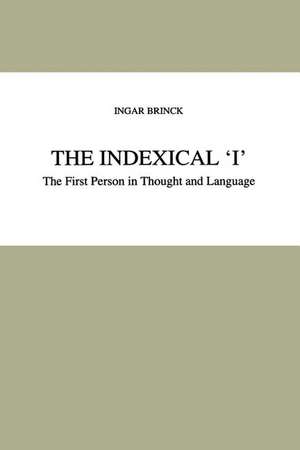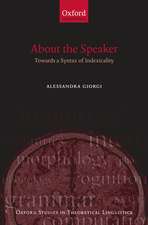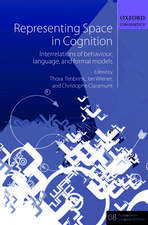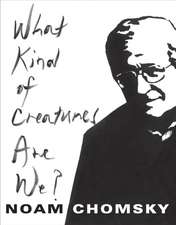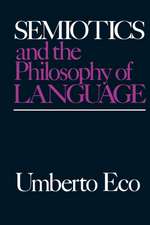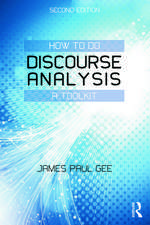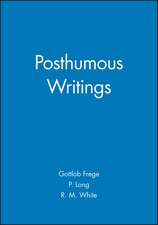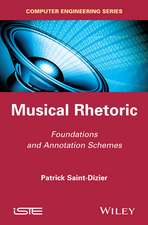The Indexical ‘I’: The First Person in Thought and Language: Synthese Library, cartea 265
Autor I. Brincken Limba Engleză Paperback – 6 dec 2010
| Toate formatele și edițiile | Preț | Express |
|---|---|---|
| Paperback (1) | 635.31 lei 6-8 săpt. | |
| SPRINGER NETHERLANDS – 6 dec 2010 | 635.31 lei 6-8 săpt. | |
| Hardback (1) | 641.03 lei 6-8 săpt. | |
| SPRINGER NETHERLANDS – 31 aug 1997 | 641.03 lei 6-8 săpt. |
Din seria Synthese Library
- 15%
 Preț: 638.43 lei
Preț: 638.43 lei - 18%
 Preț: 989.98 lei
Preț: 989.98 lei - 15%
 Preț: 596.69 lei
Preț: 596.69 lei - 18%
 Preț: 903.93 lei
Preț: 903.93 lei - 15%
 Preț: 586.88 lei
Preț: 586.88 lei - 15%
 Preț: 696.50 lei
Preț: 696.50 lei - 18%
 Preț: 892.90 lei
Preț: 892.90 lei - 15%
 Preț: 643.34 lei
Preț: 643.34 lei -
 Preț: 282.33 lei
Preț: 282.33 lei - 5%
 Preț: 372.19 lei
Preț: 372.19 lei -
 Preț: 443.10 lei
Preț: 443.10 lei - 15%
 Preț: 637.59 lei
Preț: 637.59 lei - 18%
 Preț: 958.88 lei
Preț: 958.88 lei - 15%
 Preț: 642.36 lei
Preț: 642.36 lei - 18%
 Preț: 1230.66 lei
Preț: 1230.66 lei - 15%
 Preț: 642.83 lei
Preț: 642.83 lei - 18%
 Preț: 1000.39 lei
Preț: 1000.39 lei -
 Preț: 389.70 lei
Preț: 389.70 lei - 15%
 Preț: 637.28 lei
Preț: 637.28 lei - 18%
 Preț: 952.26 lei
Preț: 952.26 lei - 18%
 Preț: 1231.32 lei
Preț: 1231.32 lei - 15%
 Preț: 645.96 lei
Preț: 645.96 lei -
 Preț: 395.85 lei
Preț: 395.85 lei -
 Preț: 400.47 lei
Preț: 400.47 lei - 18%
 Preț: 1225.48 lei
Preț: 1225.48 lei - 15%
 Preț: 638.89 lei
Preț: 638.89 lei - 18%
 Preț: 1232.09 lei
Preț: 1232.09 lei -
 Preț: 380.45 lei
Preț: 380.45 lei -
 Preț: 394.87 lei
Preț: 394.87 lei - 15%
 Preț: 640.37 lei
Preț: 640.37 lei - 15%
 Preț: 639.08 lei
Preț: 639.08 lei -
 Preț: 381.98 lei
Preț: 381.98 lei - 15%
 Preț: 643.00 lei
Preț: 643.00 lei - 15%
 Preț: 672.29 lei
Preț: 672.29 lei
Preț: 635.31 lei
Preț vechi: 747.43 lei
-15% Nou
Puncte Express: 953
Preț estimativ în valută:
121.60€ • 132.13$ • 102.21£
121.60€ • 132.13$ • 102.21£
Carte tipărită la comandă
Livrare economică 21 aprilie-05 mai
Preluare comenzi: 021 569.72.76
Specificații
ISBN-13: 9789048149087
ISBN-10: 9048149088
Pagini: 192
Ilustrații: XII, 179 p.
Dimensiuni: 155 x 235 x 10 mm
Greutate: 0.28 kg
Ediția:Softcover reprint of hardcover 1st ed. 1997
Editura: SPRINGER NETHERLANDS
Colecția Springer
Seria Synthese Library
Locul publicării:Dordrecht, Netherlands
ISBN-10: 9048149088
Pagini: 192
Ilustrații: XII, 179 p.
Dimensiuni: 155 x 235 x 10 mm
Greutate: 0.28 kg
Ediția:Softcover reprint of hardcover 1st ed. 1997
Editura: SPRINGER NETHERLANDS
Colecția Springer
Seria Synthese Library
Locul publicării:Dordrecht, Netherlands
Public țintă
ResearchCuprins
1. Introduction.- 1.1 The topic.- 1.2 ‘I’.- 1.3 Why ‘I’ cannot be replaced by another indexical.- 1.4 The content.- 2. ‘I’ Does Not Refer.- 2.1 The non-referential thesis.- 2.2 Wittgenstein on ‘I’.- 2.3 Anscombe’s argument.- 2.4 Immunity to error through misidentification.- 2.5 The basis of the immunity.- 3. ‘I’ Refers Directly.- 3.1 The minimal thesis.- 3.2 Direct reference.- 3.3 The semantic theory of direct reference.- 3.4 Direct reference and rigid designation.- 3.5 Rigid designation and essentialism.- 3.6 Objections to the semantic theory of direct reference.- 3.7 Perry on belief and meaning.- 3.8 Direct reference, presemantics, and pragmatics.- 3.9 Attitudes de se.- 3.10 Acquaintance and direct reference.- 4. ‘I’ Refers Indirectly.- 4.1 Indirect reference and definite descriptions.- 4.2 Frege on ‘I’.- 4.3 Does the individual concept conflict with publicness?.- 4.4 Making sense of Frege: concepts and causes.- 4.5 Making sense of Frege: the individual concept.- 5. Indexicality andNon-Conceptual Content.- 5.1 The basis of de re senses: non-conceptual content.- 5.2 Identification-free knowledge and its foundation.- 5.3 Non-conceptual content and IEM.- 5.4 Can content be non-conceptual?.- 5.5 The cognitive role of de re senses.- 6. Context-Independence.- 6.1 Speakers and persons.- 6.2 Transcending the context.- 6.3 Identity over time.- 6.4 A view from nowhere?.- 6.5 Understanding ‘I’: conclusion.- References.
